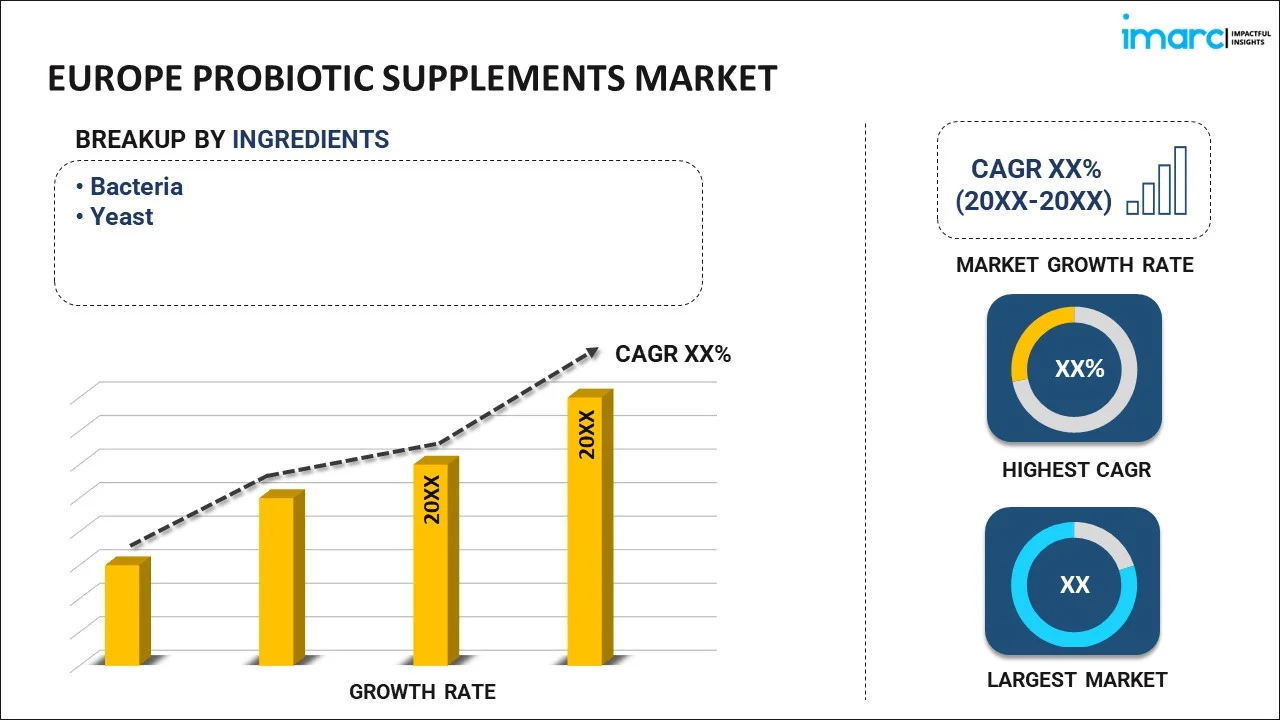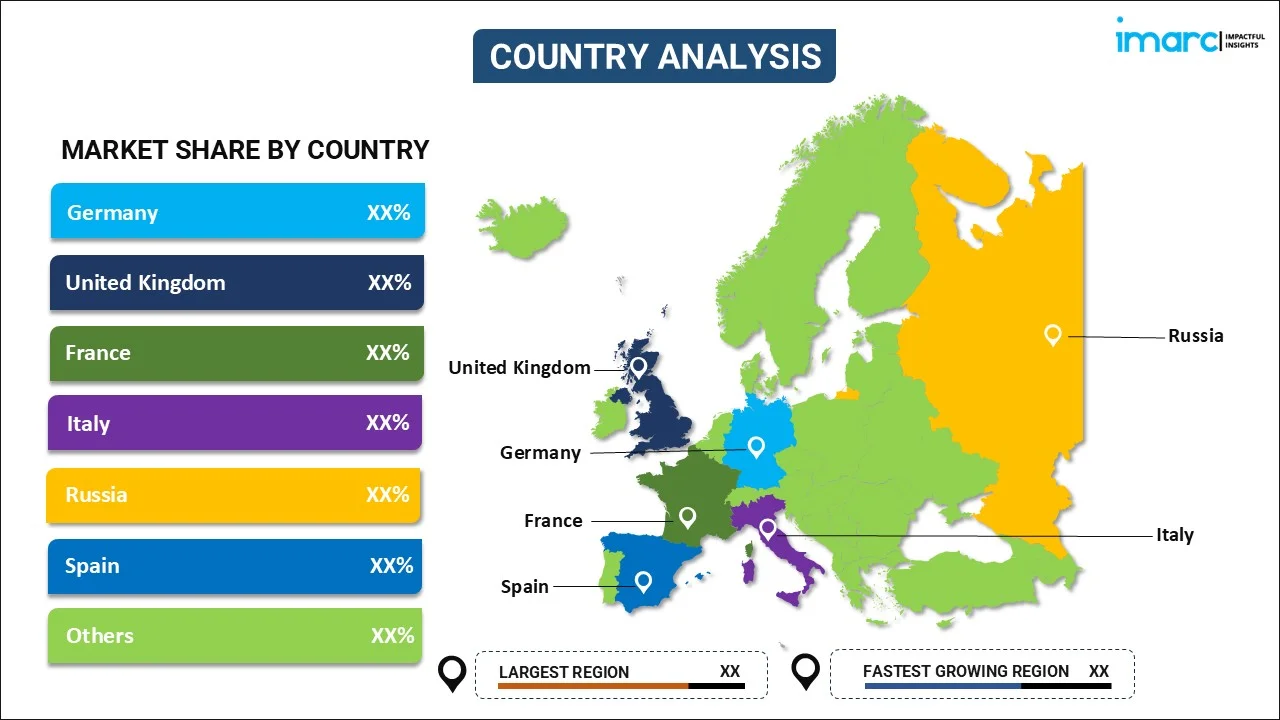
Europe Probiotic Supplements Market Report by Ingredient (Bacteria, Yeast), Form (Powder, Tablet, Liquid, and Others), Application (Food Supplements, Nutritional Supplements, Speciality Nutrients, Infant Formula, and Others), Distribution Channel (Supermarkets and Hypermarkets, Hospitals & Clinics, Pharmacies, Online, and Others), and Country 2025-2033
Market Overview:
The Europe probiotic supplements market size reached USD 2.1 Billion in 2024. Looking forward, IMARC Group expects the market to reach USD 3.1 Billion by 2033, exhibiting a growth rate (CAGR) of 4.5% during 2025-2033.
|
Report Attribute
|
Key Statistics
|
|---|---|
|
Base Year
|
2024
|
|
Forecast Years
|
2025-2033
|
|
Historical Years
|
2019-2024
|
|
Market Size in 2024
|
USD 2.1 Billion |
|
Market Forecast in 2033
|
USD 3.1 Billion |
| Market Growth Rate 2025-2033 | 4.5% |
Probiotic supplements refer to the type of dietary products that include microorganisms as functional ingredients. Some of the common microorganisms present in these supplements include Lactobacilli, Bifidobacterium, Streptococcus Thermophilus, Saccharomyces Boulardii, etc. Probiotic supplements offer numerous health benefits in maintaining a healthy balance of gut microbiomes, minimizing inflammatory responses, enhancing mental health conditions, boosting immunity, etc. These supplements are widely available in the forms of food supplements, nutritional supplements, specialty nutrients, infant formula, etc.
In Europe, the rising prevalence of numerous chronic ailments, such as Gastroesophageal Reflux Disease (GERD), Crohn’s disease, gastroenteritis, etc., is primarily driving the demand for probiotic supplements. Furthermore, the growing elderly population, who are more prone to gastrointestinal ailments, is also propelling the market growth in the region. In Europe, the gradual shift in consumer preferences from carbonated and high-calorie drinks towards functional and probiotic beverages is also catalyzing the market growth. In line with this, the launch of numerous innovative product variants in exotic flavors and attractive packaging is further contributing to the sales of probiotic supplements in the region. Moreover, the increasing demand for fortified food items and drinks, particularly for preventive therapies or post-disease treatment, is positively influencing the market for probiotic supplements. In the coming years, the changing consumer inclination from chemical additives-based supplements towards natural, organic, and clean-labeled alternatives, including probiotic supplements, will continue to drive the market growth in Europe.
Key Market Segmentation:
IMARC Group provides an analysis of the key trends in each sub-segment of the Europe probiotic supplements market report, along with forecasts at the regional and country level from 2025-2033. Our report has categorized the market based on ingredient, form, application and distribution channel.
Breakup by Ingredient:

- Bacteria
- Lactobacilli
- Bifidobacterium
- Streptococcus Thermophilus
- Yeast
- Saccharomyces Boulardii
- Others
Breakup by Form:
- Powder
- Tablet
- Liquid
- Others
Breakup by Application:
- Food Supplements
- Nutritional Supplements
- Speciality Nutrients
- Infant Formula
- Others
Breakup by Distribution Channel:
- Supermarkets and Hypermarkets
- Hospitals & Clinics
- Pharmacies
- Online
- Others
Breakup by Country:

- Germany
- France
- United Kingdom
- Russia
- Italy
- Spain
- Others
Competitive Landscape:
The competitive landscape of the industry has also been examined with some of the key players being BioGaia, Bio-K Plus International Inc., Chr. Hansen Holding A/S, Daflorn Probiotics UK, Danone S.A, Exden, IPA EUROPE, PepsiCo Inc., Vitafoods and Yakult Honsha.
Report Coverage:
| Report Features | Details |
|---|---|
| Base Year of the Analysis | 2024 |
| Historical Period | 2019-2024 |
| Forecast Period | 2025-2033 |
| Units | Billion USD |
| Segment Coverage | Ingredient, Form, Application, Distribution Channel, Country |
| Countries Covered | Germany, France, United Kingdom, Russia, Italy, Spain, Others |
| Companies Covered | BioGaia, Bio-K Plus International Inc., Chr. Hansen Holding A/S, Daflorn Probiotics UK, Danone S.A, Exden, IPA EUROPE, PepsiCo Inc., Vitafoods and Yakult Honsha |
| Customization Scope | 10% Free Customization |
| Post-Sale Analyst Support | 10-12 Weeks |
| Delivery Format | PDF and Excel through Email (We can also provide the editable version of the report in PPT/Word format on special request) |
Key Questions Answered in This Report
The Europe probiotic supplements market was valued at USD 2.1 Billion in 2024.
We expect the Europe probiotic supplements market to exhibit a CAGR of 4.5% during 2025-2033.
The rising consumer preference from carbonated and high-calorie drinks towards functional and probiotic beverages, such as probiotic supplements, as they aid in minimizing inflammatory responses, enhancing mental health conditions, boosting immunity, etc., is primarily driving the Europe probiotic supplements market.
The sudden outbreak of the COVID-19 pandemic has led to the changing consumer inclination from conventional brick-and-mortar distribution channels towards online retail platforms for the purchase of probiotic supplements across several European nations.
Based on the ingredient, the Europe probiotic supplements market can be segmented into bacteria and yeast. Currently, bacteria accounts for the majority of the total market share.
Based on the form, the Europe probiotic supplements market has been divided into powder, tablet, liquid, and others. Among these, liquid currently exhibits a clear dominance in the market.
Based on the distribution channel, the Europe probiotic supplements market can be segregated into supermarkets and hypermarkets, hospitals & clinics, pharmacies, online, and others. Currently, supermarkets and hypermarkets hold the largest market share.
On a regional level, the market has been classified into Germany, France, United Kingdom, Russia, Italy, Spain, and others, where Italy currently dominates the Europe probiotic supplements market.
Some of the major players in the Europe probiotic supplements market include BioGaia, Bio-K Plus International Inc., Chr. Hansen Holding A/S, Daflorn Probiotics UK, Danone S.A, Exden, IPA EUROPE, PepsiCo Inc., Vitafoods, and Yakult Honsha.
Need more help?
- Speak to our experienced analysts for insights on the current market scenarios.
- Include additional segments and countries to customize the report as per your requirement.
- Gain an unparalleled competitive advantage in your domain by understanding how to utilize the report and positively impacting your operations and revenue.
- For further assistance, please connect with our analysts.
 Request Customization
Request Customization
 Speak to an Analyst
Speak to an Analyst
 Request Brochure
Request Brochure
 Inquire Before Buying
Inquire Before Buying




.webp)




.webp)












